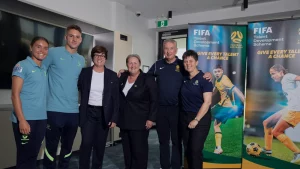 Devised in consultation with FIFA’s Technical Department, Football Australia this week launched Australian football’s Talent Development Scheme (TDS) with comprehensive and broad-ranging talent identification and development at its core.
Devised in consultation with FIFA’s Technical Department, Football Australia this week launched Australian football’s Talent Development Scheme (TDS) with comprehensive and broad-ranging talent identification and development at its core.
Australia’s bespoke project has been constructed with a number of specific relevant areas in mind, including not only the nation’s wide-spread populace, but also finding a suitable balance between its male and female player populations. The TDS has already been successfully piloted and will now be fully implemented over the coming three years.
With the six-month anniversary of the 2023 FIFA Women’s World Cup Final™ marked this week and given FA’s stated legacy goal of growing the area of women’s High Performance, the announcement at the Home of the Matildas in Melbourne was particularly well timed.
“The unveiling and subsequent implementation of Football Australia’s Talent Development Scheme underscores our alignment with FIFA’s global standards for talent development, signalling our pursuit of excellence on the world stage,” said Football Australia CEO James Johnson.
Kick-started under the guidance of FIFA Chief of Global Football Development Arsene Wenger in 2020, the FIFA Talent Development Scheme aims to help member associations fulfil their potential by ensuring that every talented player has a chance to be detected and developed. Driven by FIFA’s desire for long-term dedication to growing global talent development, the TDS will help raise the standards of national team football around the world for both men and women.
Already there are signs of dividends paying off for FIFA’s focus on football development in all corners of the globe. FIFA President Gianni Infantino described last year’s Women’s World Cup as “truly transformational” in recognition of both the tournament’s off-field success, and the incredible rapid on-field growth in women’s football. The recent AFC Asian Cup – in which Australia’s men reached the quarter-finals – further underlined the recent rapid development in the world’s largest continent.
FIFA’s Ecosystem Analysis referenced recommendations for Football Australia’s vision which include enhancing identification and talent promotion opportunities, efficiencies in data management, player tracking improvements and maximising identification efforts in rural areas.
“Football Australia’s TDS Talent Identification Project is an innovative initiative to identify emerging talents across the landscape of Australia for boys and girls,” April Heinrichs said in Melbourne this week in her role as FIFA High Performance Specialist. In her playing and coaching career, Heinrichs memorably won the FIFA Women’s World Cup in 1991 as a player, and the Olympics in 2004 as a Coach.
“This project will create a national conversation on what national-calibre players look like across youth age-groups. Football Australia’s approach is the first of its kind – a holistic and inclusive process, tracking top talents while engaging more coaches in the process,” Heinrichs continued.
“Football Australia’s TDS project links directly to identifying boys and girls for youth national teams. In fact, on the evening of the launch, there was a young female selected for the upcoming U-17 camp as a replacement player, who received her chance due to an injury. It transpired that she was one of the youngest players who had been invited to a TDS match and she will now attend her first national team camp.”
A focus on identification efforts in rural areas is particularly relevant in Australia where a significant portion of the population are spread over a vast geographical area, and often removed from the major hubs that are the state capital cities.
“Historically, players identified for our national youth teams have resided in major metropolitan areas, where they have been part of A-League club set-ups or in Member Federation programs,” said Football Australia Chief Football Officer Ernie Merrick.
“This approach to talent identification has often meant that players based regionally, or who aren’t part of an existing elite pathway, have little opportunity to get on the radar of national teams’ technical staff.
“To ensure our youth and senior national teams achieve success both within Asia and globally, it is vitally important we are identifying and developing the best players from all corners of Australia and that no one is left behind,” added Merrick, who boasts wide-ranging coaching experience from state academy and national youth teams, to an A-League Men championship winner with Melbourne Victory.
A focus on identification efforts in rural areas is particularly relevant in Australia where a significant portion of the population are spread over a vast geographical area, and often removed from the major hubs that are the state capital cities.
“Historically, players identified for our national youth teams have resided in major metropolitan areas, where they have been part of A-League club set-ups or in Member Federation programs,” said Football Australia Chief Football Officer Ernie Merrick.
“This approach to talent identification has often meant that players based regionally, or who aren’t part of an existing elite pathway, have little opportunity to get on the radar of national teams’ technical staff.
“To ensure our youth and senior national teams achieve success both within Asia and globally, it is vitally important we are identifying and developing the best players from all corners of Australia and that no one is left behind,” added Merrick, who boasts wide-ranging coaching experience from state academy and national youth teams, to an A-League Men championship winner with Melbourne Victory.
Geographical challenges are just one of the hurdles faced by football in Australia. The sports-mad nation boasts a host of various sporting competitions with the Sydney region alone home to over two dozen sporting teams across numerous sports, all competing for elite athletes.
Female player numbers are up around 30 per cent in New South Wales, the nation’s largest state, adding to the challenge of player identification.
Football Australia Technical Director – Women’s Football and Junior Matildas Head Coach, Rae Dower believes the TDS is perfectly timed following the nation’s highly successful co-hosting of the FIFA Women’s World Cup 2023.
“Australia is still in the grips of ‘Matildas Mania’ following the most successful women’s sporting event on the planet ever and as a result, more girls, and boys want to play football,” said Dower, whose extensive CV also includes participating in FIFA’s inaugural Coach Mentorship Programme and helping deliver the FIFA Coach Educators’ Development Programme in Australia two years ago.
“Registrations for this coming season are skyrocketing with clubs around the country bursting at the seams. With more players playing the game than ever, it’s important that we work strategically to identify, nurture, and develop the next generation [of national team players].
“It’s incredibly important that every girl or boy who wakes up each morning and wants to be a Matilda or a Socceroo gets the same opportunity to follow their dreams and to achieve their football potential. With Football Australia staff collaborating with state and territory member federation staff, we can hold more talent development matches across the country and have more eyes, more often, scouting for the next generation of talented players.”
Data driven talent identification is one of the tools implemented by Football Australia. The Talent ID Webform will allow accredited and approved coaches to submit technical assessments on players at club matches, plus state and national talent identification matches. Underpinning Football Australia’s TDS is the scheduling of frequent Talent Development Scheme matches in every state and territory.
“The approach taken by Football Australia in incorporating FIFA’s technical expertise to develop their TDS strategy showcases our joint commitment to foster the growth and development of the next generation of Australian football talent, ensuring we give every aspiring talent the chance to be identified and supported” added Steven Martens, FIFA Director of Football Global Development.
FIFA’s Head of High Performance Ulf Schott concurred. “It’s fantastic to see how Football Australia, in close collaboration with FIFA, has developed an innovative plan to identify and nurture talents even more effectively. This approach will undoubtedly contribute to strengthening and enriching the future development of football at the international level” he concluded.
 Arunava about Football A look at football & the world through my eyes!
Arunava about Football A look at football & the world through my eyes!



